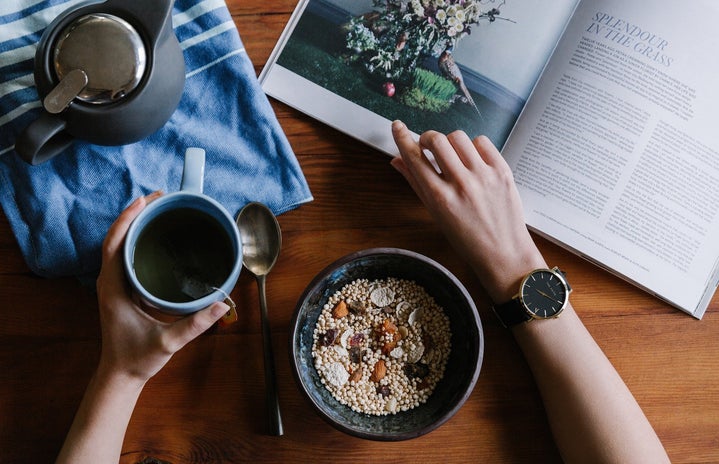Trigger Warning: Talk of bad eating habits.
Being a college student is a lot — plain and simple.
If you’re like me, you find yourself most productive when you’re busy, mindlessly loading up your social, academic and extra-curricular metaphorical “plates,” completely forgetting to fill your literal plate.
During freshman year, I was not as busy as I was this year and I lived in a dorm, steps away from the dining hall, full of cheap, prepared meals. This year I’m off-campus, grocery shopping, finding recipes and cooking for myself.
Between four hours of consecutive classes, running from meeting to meeting and studying, I find myself forgetting to eat, having only a granola bar, apple, a few sips of water and at best one meal a day. These eating habits are forming a cycle in my daily routine and I’m starting to recognize the effects they’re having on my physical and mental health.
On the days when I’m rushing to my 9 a.m. class, I forget “the most important meal of the day,” breakfast. I can feel the difference that skipping breakfast makes in my focus. I feel sluggish and even two hours later, I still feel like I just rolled out of bed.
On the days when I have class from noon to 4 p.m. or I have three meetings right in a row from 6 to 9 p.m., I convince myself I just simply don’t have time to eat. I tell myself “I’ll eat after this,” or “I’ll eat later.” But I can’t keep getting to the point where I’m “starving.”
My body tells me exactly what it needs and I make the conscious decision to ignore it, negatively feeling the effects it has on me and wondering why I feel unproductive. Because of this, I’ve started making time to eat.
Making Time to Grocery Shop
If you’re living in an apartment, you’re most likely cooking for yourself on most days. This can be time-consuming from even the beginning of the process: making time to get the food you’re cooking with.
The best thing to do when grocery shopping is to make a mock-up menu for your week. This makes walking through the grocery store a whole lot less stressful, being able to grab food easily, making a seemingly long trip turn into an “in-n-out” routine every week that you won’t have to dread.
Find a time when you aren’t busy during the weekdays to grocery shop. Avoid the grocery store on Sundays (the busiest grocery day) so you can save yourself so much time simply by not having to wait in long lines.
Make Time to Cook
Maybe even after grocery shopping, carve out 30-45 minutes for meal prep. Gather your meals for the week in microwaveable containers, shaving down meal prep time later in the week to two to three minutes max.
This time will hopefully deter you from not cooking just because you get home on a Thursday night and are simply too tired. Always add protein into the meal prep to hold you over for a longer amount of time, giving you the proper fuel for your day.
Substantial Snack Choices
For the times while you’re walking on campus and having back-to-back classes, it’s hard to sit down and eat. However, it’s important to fuel yourself in those 15 minutes between classes. Food will help your focus and make these back-to-back classes worth your time, as you’ll be able to retain the information better.
While grocery shopping, make sure your “grab-n-go” snacks are substantial. While “PopTarts” and potato chips are delicious, you’ve probably heard these are not “brain foods.” Switch the “PopTart” out for a sweet “KIND Bar,” or switch the crunch of chips out with nuts like almonds, cashews or any sort of trail mix.
Although these may be changes to your lifestyle, they’re simple switches that can make a world of a difference in your eating and learning habits. I hope that these recommendations are able to help you as much as they’ve helped me.


